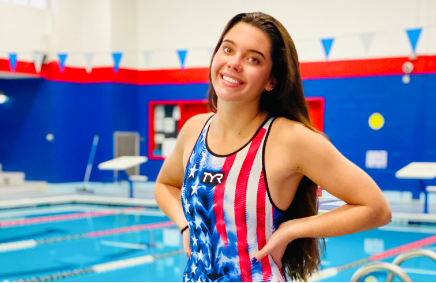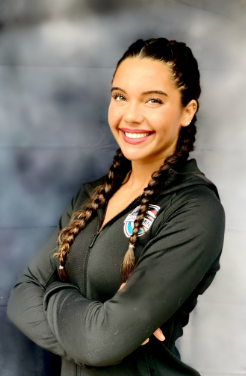Stay in your lane, Pagonis
August 18, 2021
A young American swimmer with vision loss emerges from deep depression to break world records and fast-track her voyage to the Tokyo 2021 Paralympics. Want to keep up with Anastasia Pagonis? Good luck.

Anastasia Pagonis began to notice her vision loss at age 11. She turned to swimming to protect her head and vision.
The 17-year-old blind swimmer from Long Island, NY, sped through the water with one goal in mind: Tokyo. Making the turn at the far end of her lane, she pushed off the wall for her last lap in the 400-meter freestyle and raced for the finish line. When her fingers touched the wall at the edge of the pool, she came up panting, listening hard to what her mom was saying. Through the crowd noise, she heard the results, and her smile said it all. Despite her vision loss, despite being shunned years earlier by her sighted swimming community, despite a year of depression, Anastasia Pagonis was on her way to the 2021 Paralympics.
Like the rest of the athletes hoping to earn a spot in Tokyo, Pagonis had been carefully tracking whether the Paralympics would happen at all. Both the Tokyo Olympics and Paralympics had originally been slated for 2020, but the global pandemic forced postponement. Yet thanks to careful planning and execution of COVID-19 safety protocols, 4,000 elite athletes competed in 22 sports during the August 24–September 5 events. Pagonis was there, too, ready to go for the gold as an S11 para swimmer representing the United States.
Diagnosis: Falling into the Deep End
Three years earlier, Pagonis couldn’t have imagined being there. Her problems had started when she was 11 and began having trouble seeing on the soccer field. After a battery of doctor appointments and tests, she received a diagnosis: Stargardt disease. At the time, she had 20-400 vision and no central vision. Believing her eyes had stabilized, Pagonis’s retina specialist recommended she trade in soccer for swimming, to protect her head—and her eyes—from soccer balls and unintentional kicks.
What nobody knew, however, was that she had been misdiagnosed. In 2018, at 14, she suddenly and rapidly lost the rest of her vision. The result? More doctors, and more tests, including a genetic test that revealed two autoimmune retinopathies and inherited retinal disease caused by mutations on the gene associated with retinitis pigmentosa (RP), Stargardt disease, and cone-rod dystrophy (CRD). For Pagonis and her family, the diagnosis was devastating.
The young athlete went to her swim team coach, explained what had happened, and asked how they might continue working together. But Pagonis’s coach didn’t want to change his style to accommodate a swimmer with vision loss. Worse, her teammates began to bully her. “My team became really abusive,” Pagonis recalls. “They didn’t want to help me. It was a very bad experience.”
Despite her vision loss, despite being shunned years earlier by her sighted swimming community, despite a year of depression, Anastasia Pagonis was on her way to the 2021 Paralympics.
A Swimmer Finds Her Coach
Coupled with her rapid vision loss, and the stiff-arm from her teammates, Anastasia began a downward spiral that resulted in a year-long depression. She quit swimming and spent hours in bed, despondent, until her parents encouraged her to find another coach. “We had to find one who wanted to train ‘the blind girl,’” Pagonis says, “and nobody wanted to take that on.”
Enter Marc Danin, head coach and owner of Islanders Aquatics on Long Island.

On her way to the 2021 Paralympics in Tokyo, 17-year-old Pagonis broke several world records, including the 400-meter freestyle.
The swimmer lights up when she talks about him. “Marc is, honestly, my best friend. He is the reason I am where I am today,” she smiles. When she first approached Danin, Pagonis had already been rejected by most swim coaches in the area. This time was different: Danin said “yes” and began to alter his coaching style to accommodate her specific needs. He covered his own goggles in duct tape and swam laps to get a feel for her challenges. He learned to use the “tapper,” a tool used in the pool to tap a swimmer’s head and alert them that they’re approaching the wall. When Pagonis feels the tap, she knows it’s time to make the turn.
During the Paralympic Trials in Minnesota, Coach Danin tracked the event via Zoom. He and Pagonis had focused their training on the 400-meter freestyle, and her goal was to beat the world record. Pagonis’s mom, Stacey, served as her tapper during the preliminary race. “Right when I touched the wall I said, ‘Mom! What’d I do?’” From the pool deck, Stacey told her daughter what she couldn’t see: that not only did she win, she had also beaten the world record with a time of 4:56:16!
“I couldn’t stop smiling,” Pagonis remembers. “My coach told me that my smile at the end was absolutely pure.” The accomplishment itself would have been good enough, but the emerging swimmer wasn’t quite done. During the finals for the 400-meter freestyle, she crushed her own world record—and set a new one in the women’s 100 free. She had officially captured the attention of the world and was on her way to Japan.
All Eyes on Tokyo
Pagonis arrived in Tokyo with arms and heart wide open, excited to race against the best athletes in the world. “We’re all supportive of each other, even though we’re from different countries,” she beams. The swimmer was also thrilled that U.S. Paralympians and Olympians now earn equal payouts for medal performances. That 2018 decision, she explains, reflects the name of the competition itself: “The Paralympics were made to be parallel with the Olympics. That’s what ‘para’ stands for.”
Like other Paralympians, Pagonis is vocal about wanting to see the same kind of equality happen with sponsorships and monthly stipends given to athletes during training, and she has the platform to get the word out. Not only is she a world-class athlete, but she’s also an internet influencer, with nearly 2,000,000 TikTok followers and 178,000 on Instagram. When she talks, her fans listen.
“We work just as hard as Olympians—sometimes more, because we have disabilities,” Pagonis suggests. “We are equal. Just because we have disabilities doesn’t mean that we’re less than other people.” And she’s right. For this young athlete, the loss of her vision has presented an opportunity for something more: a completely different kind of win.
